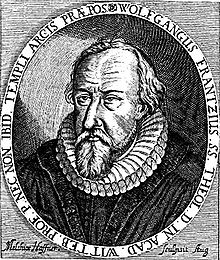Wolfgang Franz (theologian)
Wolfgang Franz (also: Frantz , Franzius ; * October 1564 in Plauen ; † October 26, 1628 in Wittenberg ) was a German Lutheran theologian.
Life
Born as the son of the bricklayer and cloth maker Phillipus Frantz and his wife Martha, the daughter of Plauen councilor Wolff Mühling, he was educated at the school in his hometown. After he had also attended school in Küstrin , he studied at the University of Frankfurt (Oder) , where he was accepted by his uncle M Joachim Franz, and from 1585 at the University of Wittenberg . There he acquired the academic degree of a master's degree from the philosophical faculty in 1587 and taught there as a private lecturer for almost a decade until he was offered a professorship in history at the Wittenberg Academy in 1598 .
His role models were those great theologians who also left significant statements or works on history: Martin Luther , Philipp Melanchthon , Paul Eber , Georg Major , Georg Spalatin and David Chyträus . The Saxon and electoral scholarship holder turned to Meissner and Saxon history. The electoral administrator of Saxony gave him the chair more for the sake of supply.
As can be seen, however, Franz oriented himself more towards theological questions. In the same year he took office, he obtained his doctorate in theology, whereupon he resigned his professorship in 1601 and went to Kemberg as provost . With the death of Salomon Gesner in 1605 he gained access to a theological professorship, was associated with provost of the Wittenberg Castle Church and in 1616 assessor at the Wittenberg consistory. He held the rectorate of the university three times, was diligently available to provide advice and assistance, and was particularly committed to helping poor students.
Although people initially suspected Franz because he had made himself suspicious of Calvinism , he prevailed over the course of his term of office and developed into a typical representative of the Lutheran orthodoxy represented in Wittenberg . As an author, his extensive writings were important in his time and some of them had several editions. Above all, his pamphlets against the Roman Catholic Church , Calvinism and Socinianism stand out. Franz's teaching activity was abruptly ended by a stroke which in 1620 threw him into a long, hopeless, sick bed.
Franz was married twice:
- 1. Marriage on January 25, 1591 to Anna, the daughter of the Köthen superintendent M. Petrus Harring. Three sons and a daughter, a son M. Wolfgang Franz, who worked in Lusatia, survived the father.
- 2. Marriage in 1618 with Sabina, the daughter of the Wittenberg professor of medicine Ernestus Hettenbach , no children.
Selection of works
- Augustanae confessionis articuli priores decem, 1609, 1610
- Disputationes 24 super Auguastranam confessionem integram, 1611, 1620
- Syntagma controversiarium theologicarum, 1612
- Disputationes per integrum Deuteronorium, 1608
- De interpretatione S. Scriptuarum maxime legitima, 1609 a. sp.
- Animalium historia sacra, 1612 to 1712 in numerous editions
literature
- Kenneth G. Appold: Franz, Wolfgang . In: Religion Past and Present (RGG). 4th edition. Volume 3, Mohr-Siebeck, Tübingen 2000, Sp. 246.
- Friedrich Wilhelm Bautz : Franz, Wolfgang. In: Biographisch-Bibliographisches Kirchenlexikon (BBKL). Volume 2, Bautz, Hamm 1990, ISBN 3-88309-032-8 , Sp. 112.
- Walter Friedensburg : History of the University of Wittenberg . Max Niemeyer publishing house , Halle (Saale) 1917.
- Heinz Kathe : The Wittenberg Philosophical Faculty 1502–1817 (= Central German Research. Volume 117). Böhlau, Cologne / Weimar / Vienna 2002, ISBN 3-412-04402-4 .
- Gustav Moritz Redslob: Franz, Wolfgang . In: Allgemeine Deutsche Biographie (ADB). Volume 7, Duncker & Humblot, Leipzig 1877, p. 319 f.
- Fritz Roth : Complete evaluations of funeral sermons and personal documents for genealogical and cultural-historical purposes. Volume 4, self-published, Boppard am Rhein 1965, R 3251.
- August Tholuck : Witnesses of the Lutheran Church from all classes before and during the period of the Thirty Years' War. Wiegandt & Grieben, Berlin 1859 ( digitized version ).
- Franzius, Wolffgang. In: Johann Heinrich Zedler : Large complete universal lexicon of all sciences and arts . Volume 9, Leipzig 1735, column 1761.
- Hans-Joachim Böttcher : Fran (t) z (Franzius), Wolfgang, in: Important historical personalities of the Dübener Heide, AMF - No. 237, 2012, p. 26.
Web links
- Publications by and about Wolfgang Franz in VD 17 .
- Franz, Wolfgang in the common library network
- Franz, Wolfgang at the German Digital Library
Individual evidence
| personal data | |
|---|---|
| SURNAME | Franz, Wolfgang |
| ALTERNATIVE NAMES | Franzius, Wolfgang; Frantz, Wolfgang |
| BRIEF DESCRIPTION | German Lutheran theologian |
| DATE OF BIRTH | October 1564 |
| PLACE OF BIRTH | Plauen |
| DATE OF DEATH | October 26, 1628 |
| Place of death | Wittenberg |
